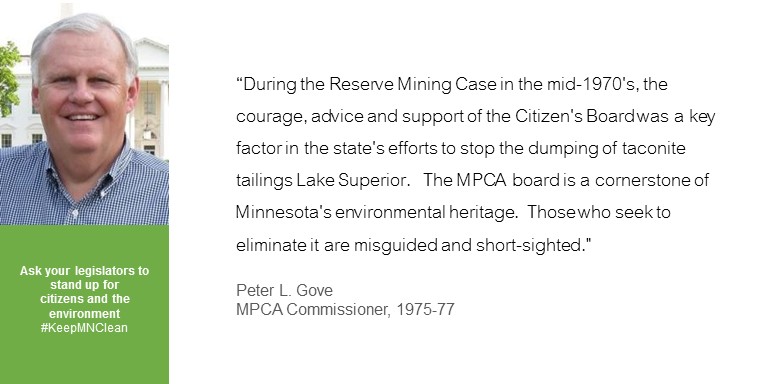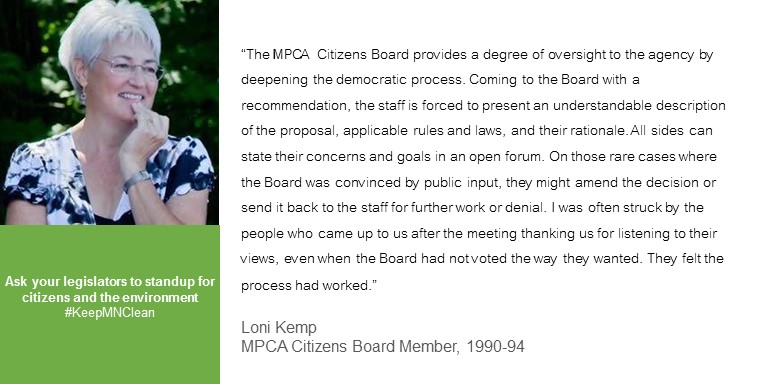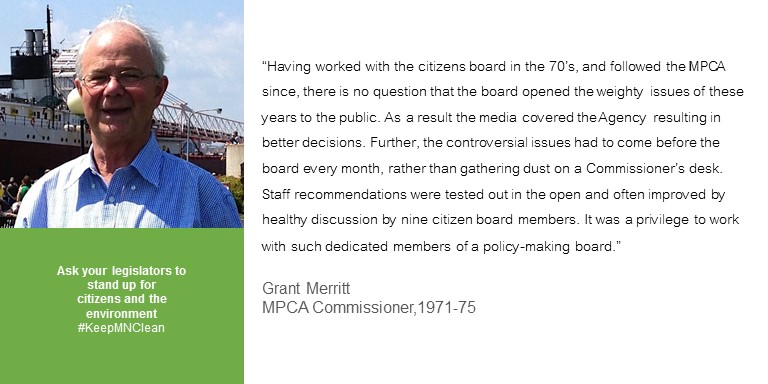Late on the night of Saturday, May 16, language was inserted into the conference committee report on HF 846, the Agriculture and Environment Finance Bill, eliminating the 48-year old MPCA Citizens Board. A bill to substantially reduce the authority of the Citizens Board (HF 1394) was previously heard in the House, but its companion was never heard in the Senate and, ultimately, the language to completely eliminate the Board was never introduced for debate or public testimony as a bill.
Governor Dayton, with the support of many citizens and environmental groups, rightly vetoed HF 846, citing the elimination of the Citizens Board as a top concern. On Monday, 23 DFL Senators sent a letter to the Governor applauding his veto of the bill and identifying four top areas of concern, the first being the elimination of the Citizens Board. Former members of the Citizens Board and MPCA leadership have also expressed their support for preserving the Board, extolling its importance for public input and democratic decision-making at the MPCA.
Unfortunately, Governor Dayton has since indicated that he’s conceding the Citizens Board in exchange for compromise yet to be revealed on other provisions. We remain hopeful that the death knell has yet to be sounded and that DFL legislators will maintain their commitment to preserve the Board during the imminent special session.
Established in 1967, the Citizens Board creates an open and transparent process for MPCA decisions that guards against undue corporate influence and provides citizens with meaningful opportunities to have their interests heard and considered. As explained today in a MinnPost article by Doug Grow, efforts to eliminate the Citizens Board have been driven by corporate agricultural interests largely in response to an isolated instance in which the Board ordered that a corporate farm prepare an environmental impact statement prior to building a massive daily operation that local citizens worried would cause water and air pollution and effect surrounding property values.
What has received less attention is that, in 2011, Governor Dayton directed the state’s Environmental Quality Board (EQB) to conduct a comprehensive examination of and to make recommendations for how to improve the environmental review process and environmental governance in general. One of two policy issues the EQB addressed its study report was whether and how the Citizens Board is beneficial to the MPCA’s decision-making process. In evaluating the issue, the EQB analyzed four alternative scenarios, one of which was to eliminate the board entirely. The benefits and drawbacks identified by the EQB of doing so speak for themselves:
Possible Benefits:
- “Eliminating the Citizens’ Board meeting step would remove an average of 45 days off project timelines, saving project proposers time and money in the short term.”
- “MPCA staff time would be saved by not having to prepare a board presentation.”
- “Cost savings to MPCA budget: per diem of Board Members because of reduced meetings (don’t need to meet every month) and staff time.”
- “Interested parties still have an opportunity to talk with MPCA staff, submit formal comments on the documents, and attend public informational meetings.”
Possible Drawbacks:
- “Interested parties may potentially take their disputed issues to the Court of Appeals, adding to the project timeline and costs…Time saved from not going to the MPCA Board may be negated because the project may end up in the Court of Appeals.”
- “Building a stronger public record through presentations, questions, decisions from a 9-member Board would not exist.”
- “A new commissioner may not be ready to make certain controversial decisions because they are not familiar with the issues and trained in the process. The new commissioner will need time to get up to speed.”
- “Final permit requirements may not satisfy interested parties. Citizens’ Board meetings can and do have an impact on final permit and environmental review decisions. Project proposers have made changes to their projects as a result of testimony of interested parties in front of the Board. Although some of these changes may not have been significant to the project proposer, it made a difference to the citizens involved.”
- “Interested parties and proposers would not have a chance to appear directly before the decision makers in a public forum, voice their concerns, and have them addressed in real time.”
- “Part of the checks and balances system and a more transparent process on contentious project decisions is gone.”
- “Although a public record is built, it may not stand up as well as through judicial review as the one built through the Citizens’ Board process, which provides additional public meeting input and back and forth dialogue with refinement/resolution of issues.”
- “Loss of diversity of perspective from nine Board members to just Commissioner.”
- “Interested parties have expressed concern that they would not get an audience with the commissioner on controversial projects.”
- “Decision on proposed project may be political if commissioner only makes the decision.”
Ultimately, the EQB resolved that:
“1. No major changes should be made to the role of the MPCA Commissioner and the MPCA Citizens’ Board in bringing permits and environmental review documents to the Citizens’ Board for decision;
2. The MPCA should evaluate and recommend specific changes to the MPCA Citizens’ Board process and the environmental review process including 1) automatic triggers that bring projects before the Board for decision; 2) timeliness of submittal of materials to the Board for inclusion into the record; and 3) review of mandatory category thresholds and environmental review program improvements currently underway.”
Quite significantly, the EQB’s resolution won praise from industry. For example, Tony Kwilas, director of environmental policy for the Minnesota Chamber of Commerce, stated “The earlier citizen and public involvement, the better. Because then it will answer most of the questions that the citizens and public usually have. . . . Anytime we can involve the public and get citizen input earlier in the process, I think is a good thing.”





“… the Citizens Board creates an open and transparent process for MPCA decisions that guards against undue corporate influence and provides citizens with meaningful opportunities to have their interests heard and considered.”
Unfortunately this is not really true. The Citizens’ Board, in its present form, is mostly a rubber stamp, allowing citizens to vent but seldom providing “meaningful” opportunities to be heard. ( I have attended quite a few Board meetings and spoken to the Board a few times, sometimes being treated respectfully and sometimes not.) The one time in recent years that the Board actually did respond to citizen input, in the notorious giant-dairy EIS case, created a furor leading to its abolition.
From what I am reading there was a time, quite a while ago, when the Citizens’ Board was a lot stronger and played an important role. This is what we need to get back to, starting with the Board having an independent chair, as opposed to being chaired by the PCA Commissioner.
Who inserted the elimination of the MPCA Citizens Board provision into the bill? Who was ultimately responsible for oversight of the insertion? Who were the 23 Senators applauding the Governor’s veto?
First, I am grateful to MEP and all of it’s member organizations for their work for the environment. At the same time, why does the Sierra Club and MEP not provide this information?